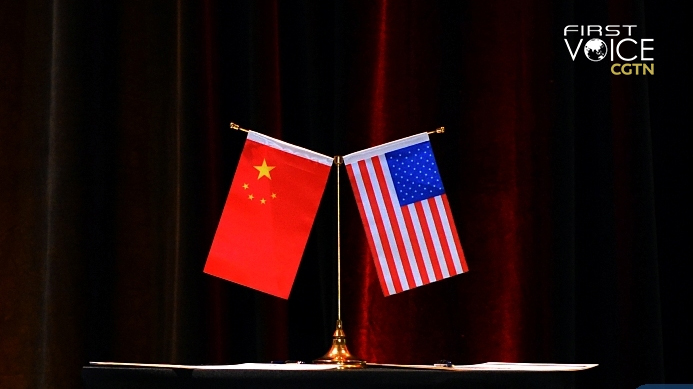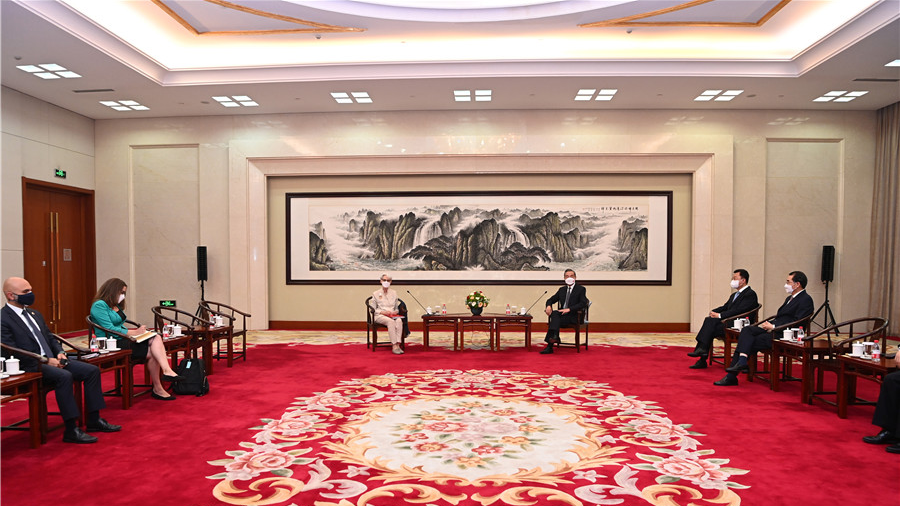
Editor's note: CGTN's First Voice provides instant commentary on breaking stories. The daily column clarifies emerging issues and better defines the news agenda, offering a Chinese perspective on the latest global events.
Some media outlets and commentators responded to U.S. Deputy Secretary of State Wendy Sherman's China visit by arguing that it represents an ossification of their positions or solidification of the rivalry. The act of China laying out its bottom lines was seen as projecting an antagonistic sentiment against the United States. The talk was compared in turn to the previous one at Alaska, where focus was on the "combative tone."
The basic question here is: Who's driving the China-U.S. rivalry? U.S. President Joe Biden is the one who talked about "winning the 21st century" or "China are going to eat our lunch." China has made it clear that it has no intention of becoming or replacing the United States. And yet, American foreign policymakers frequently depict China as a "threat" to its global dominance and believe misleadingly that the country is out to create a world order of its own and displace it as the dominant power.
Of course, China is rising and, by extension, the world order is naturally shifting away from the unipolarity that the United States once enjoyed in the 1990s. While by default that creates anxiety, it does not give due justification for the almost religiously held belief that the United States hold permanent and exclusive ideological domination over the entire world.
China has long held a foreign policy that sets out its own interests and red lines, but nonetheless gives space for compromise and co-existence with the United States. It is not a policy of absolutist hegemonism as seen in Washington.

Chinese State Councilor and Foreign Minister Wang Yi (3rd R) meets with U.S. Deputy Secretary of State Wendy Sherman (3rd L) in Tianjin, north China, July 26, 2021. /Chinese Foreign Ministry
Chinese State Councilor and Foreign Minister Wang Yi (3rd R) meets with U.S. Deputy Secretary of State Wendy Sherman (3rd L) in Tianjin, north China, July 26, 2021. /Chinese Foreign Ministry
As a comparative example, the U.S. seeks to ever expand its number of "treaty allies," putting its own military forces and influence all around the world. Its military expenditure stood at $778 billion, ranking first on the global defense spending list. The next 11 countries – including China, India, Russia and the UK – had a combined expenditure of $761 billion. The U.S. military, backed by the astronomical budget, zeroes in on maintaining a global presence. China pursues a local and regionalized approach specifically aimed at protecting its national sovereignty and defending its overseas interests when necessary.
China and the U.S. have different goals for their national development, and they are not necessarily in conflict unless people want to make them so. China wants to develop a prosperous and modern country at home and protect its national sovereignty from foreign aggression, while helping other countries find their paths to development.
This isn't in conflict with U.S. desire to stay No. 1, but it is in conflict with a No. 1 who wants to control everyone else. The China-U.S. relationship is not doomed to ossify or solidify, not at least if America is able to find respect for differences and others' interests.
China has long advocated a willingness to negotiate. If the United States wants to talk, then China says: Talk, but not when U.S. keeps attempting to condescend from "a position of strength." But that is what Washington is doing. Just after Sherman concluded her visit, U.S. Secretary of Defense Lloyd Austin threatened China with military force, claiming that the U.S. won't "flinch" if China harms U.S. interests. Now, does that sound like someone who's even reflecting on China's demands and the bilateral relationship?
China has done as much as it could to salvage the China-U.S. relationship. It has negotiated and compromised with little reciprocity from the other side. The relationship isn't sustainable if only one party is making the effort to accommodate the other. If the U.S. doesn't re-evaluate its stance against China and start behaving like a responsible country instead of a rogue superpower, China can't respect its position and words anymore. And China won't flinch either if U.S. threatens its interest.
(If you want to contribute and have specific expertise, please contact us at opinions@cgtn.com.)

